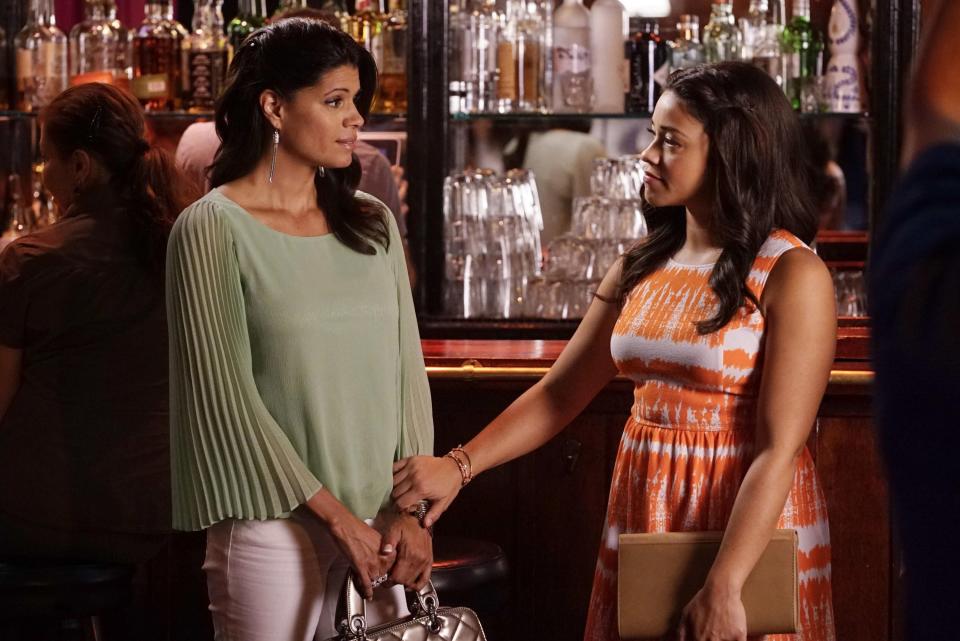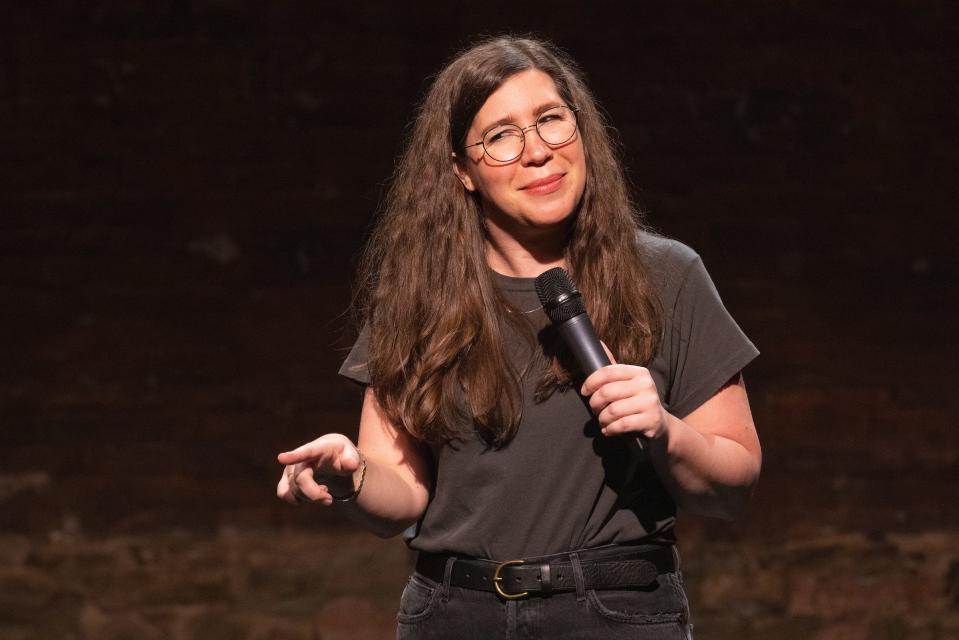Abortions in TV, film started with hysteria, then became (mostly) accurate. But what now?
- Oops!Something went wrong.Please try again later.
In 1972, Beatrice Arthur starred in one of the most highly-rated and controversial episodes of American TV history on Norman Lear's CBS comedy "Maude." The title character of the "All in the Family" spinoff became pregnant and after some soul searching and deep family discussions, decides to have an abortion.
Fifty years after this landmark moment in popular culture, which predated a Supreme Court ruling that established a constitutional right to abortion, the current court overturned that 1973 Roe v. Wade decision in Dobbs v. Jackson Women's Health Organization. Abortion rights are now decided by laws at the state level, and many outlawed abortion or severely restricted access to it immediately following the June 24 ruling.
Abortion has been a topic Hollywood writers have returned to repeatedly in film and TV: in sitcoms, drama series, teen shows, indie movies, blockbuster films and classics from "Grey's Anatomy" to "Friday Night Lights" to "American Horror Story," and from "The Godfather Part II" to 2021's "Plan B."
"Film and TV get abortion right when they recognize and highlight the diversity of abortion stories, and acknowledge that each one is informed by the lived experiences of the person seeking an abortion," says Rebecca Reingold, associate director of the Health and Human Rights Initiative at Georgetown University. Reingold notes that how abortion plays out in popular culture influences how the greater public views it in real life.
As Americans on both sides grapple with what's next, we look back on how the medical procedure has appeared in film and TV over the decades:
More: My mother wanted to explain her decision to have an abortion. I wanted to help her do that.

When abortion was a really big deal: 'Maude' to 'All My Children'
One of the earliest and most controversial TV episodes about abortion was a 1962 installment of CBS legal drama "The Defenders," in which the father-son legal team defended a doctor accused of performing illegal abortions. The episode caused a huge controversy, and regular advertisers refused to sponsor the program.
More: New movies focusing on abortion hit Sundance
The 1966 film “Alfie” takes a decidedly anti-abortion stance, after Michael Caine’s playboy helps secure a procedure for his lover (Vivien Merchant) and looks on in horror.
"Maude" depicted its main character, at age 47 and already a mother, procuring one legally near her suburban home in Tuckahoe, New York. In 1973, ABC daytime soap "All My Children" depicted a much younger single character, Erica Kane (Susan Lucci), getting a legal abortion so she could continue her modeling career.
Predictable abortion plots: The 1980s-2000s
In the late ’80s through the early 2000s, abortion became a common plot point on TV and in film. But whenever it was discussed, it was easy to predict how the plot would play out.
Vox writer Tanya Melendez categorized TV abortions of this era into three categories: The “Whew! That was close!” plot; the “and baby makes drama!” plot; and the “both sides” plot. (It's also worth adding the "punishment for going through with it" plot.)
Often, the woman considering an abortion would miscarry (or learn she wasn't really pregnant at all) before needing to make (or go through with) the decision, such as in ABC's "Party of Five" in 1996, "Grey's Anatomy" in 2005 and HBO's "Girls" in 2012. Still, other shows offered "very special episodes" about abortion, pedantically delineating the arguments for and against, as in a 1985 episode of CBS' "Cagney and Lacey."

Many women who consider having an abortion choose to have the baby and find their lives enriched by it, such as in a 1992 episode of CBS' "Murphy Brown," "Beverly Hills, 90210" in 1994 and 2007 film "Waitress."
Writers have also used abortion storylines to punish female characters. In 2004, NBC soap "Days of Our Lives" featured a storyline in which Mimi (Farah Fath) becomes infertile after having an abortion. In the 1987 film "Dirty Dancing," Penny (Cynthia Rhodes) is badly injured during a botched abortion. And Kate Winslet’s April bleeds to death after attempting a self-abortion in 2008’s “Revolutionary Road."

Realism and relaxation: The chill abortions of the last 10 years
Abortions on screen in previous decades commonly (and inaccurately) featured great danger and sometimes adverse medical consequences, says Steph Herold, who studies how abortion is portrayed onscreen for Advancing New Standards in Reproductive Health, an advocacy group. "Less than 0.25% of abortions result in a major complication – yet on screen, 18% of abortions result in a major, adverse medical complication, a nearly seventy-fold exaggeration," she says. "We know that risk makes for good TV, but because the American public has so little knowledge about abortion ... the dangerous story is understood as a typical one."
This has changed incrementally in the last 10 or so years, with more realistic portrayals of abortion, including medication, the most common form of abortion in the United States. Some TV shows and films relaxed the emotional toll for characters, making abortion a plot point much like any other.
On CW's "Jane the Virgin" and "Crazy Ex-Girlfriend," middle-aged mothers choose to have abortions with little incident in 2016 episodes. Recent films including “Plan B,” “Unpregnant” and “Never, Rarely, Sometimes, Always” have taken both comedic and dramatic looks at young women hitting the road to procure birth control pills and safe abortions, while comedies including 2014’s “Obvious Child” and 2020’s “Saint Frances” depict women who are neither defined nor traumatized by their abortions.
Still, many fail to portray the realities of abortion, including barriers to access and the race of characters who most often seek them.
"We've found that very few films and TV shows depict the most common barriers to abortion access ... and characters of color as the ones having the abortion," says Herold.

What about in the post-Dobbs world?
When the initial draft opinion in Dobbs leaked two months ago, comedian Alison Leiby was in the midst of a New York run of her one-woman show, "Oh God, A Show About Abortion," in which she talks about getting an abortion at 35.
Leiby's show is scheduled to return this fall, and she wonders how Hollywood and other artists will talk about abortions in the years to come.
"It has only been in the last few years that pop culture depicted a wider array of abortion narratives," she says in an interview that follwed the Supreme Court's reversal. "On one hand, I hope that continues, and I consider my show to be part of that trend. On the other hand, it feels challenging to tell those stories of simple abortion procedures when half the country no longer has access to them."
Hints of what the future of abortion stories might look like on screen can be glimpsed in recent films and TV shows that depict the world of illegal abortions before Roe.

Acclaimed 2021 French film "Happening" features a woman trying to obtain the procedure in 1963 France. "Call Jane" is a fictionalized film about the Jane Collective, an underground network in 1960s Chicago that helped women obtain safe abortions. (HBO's "The Janes" explores the same subject in a documentary.) PBS series "Call the Midwife," about midwives in London in the mid-20th century, followed a police investigation into illegal abortions.
Abortion has been fodder for Hollywood drama for decades; it's not going to disappear from these stories as the country navigates the uncertain post-Roe future. What remains to be seen is how true to life those stories are, and how they affect the public consciousness.
"Abortion storytelling can be both accurate and entertaining," says Herold.
Over the past 60 years, that storytelling has inched closer to finding that balance between accuracy and entertainment. As the real-life story of abortion changes in the U.S., Hollywood will have to change too.
Contributing: Patrick Ryan
This article originally appeared on USA TODAY: Abortion and Hollywood: The road from hysteria to accuracy

